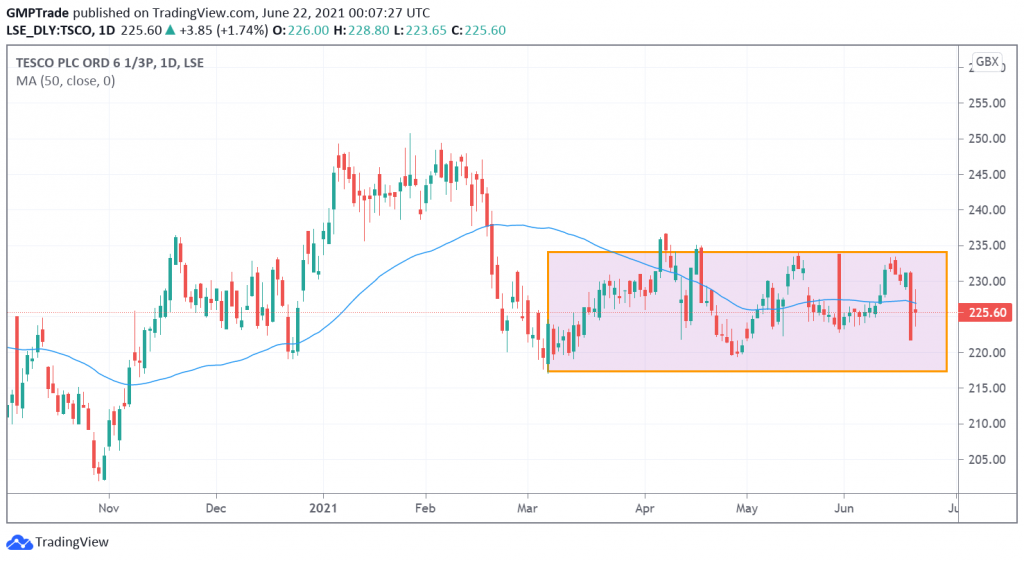Tesco share were higher by almost 2% on Monday after the company’s rival, WM Morrison, jumped 30% higher on takeover efforts.
Morrisons jumps on takeover move
Wm Morrison surged above the recent valuation of Clayton Dubilier & Rice LLC’s £5.5 billion-pound takeover bid. The move suggests that the private equity firm could have to increase their offer to be successful for the UK’s fourth-largest grocery.
The supermarket firm, which employs around 110,000 people in Britain, has rejected the 230 pence-a-share bid, which will set up a potential takeover battle. Under the UK rules, CD&R has 28 days to make an offer or walk away. The stock’s 30% gain on Monday lifted the market cap of Morrison to £5.7 billion pounds, from £4.3 billion pounds.
CD&R’s approach is the latest in a host of private equity companies showing interest in the country’s supermarket sector. A £6.5 billion-pound deal by TDR Capital and the Issa brothers was made to buy a majority stake in Asda, the U.K.’s third-largest grocer. Other private equity funds made separate bids for Asda.
For the Asda transaction, the buyers raised the largest-ever sterling junk bond, which could form part of a Morrison deal.
Tesco stumbled on Q1 earnings
The Tesco (LSE:TSCO) share price took a bit of a tumble last Friday, falling by 4% after it published its first-quarter results. This brought the stock’s 12-month performance to around -2% (taking its share consolidation into account), so it remains almost flat. But were these results as bad as the market suggests? Let’s take a look at the numbers, and see whether this is actually a buying opportunity.
The Tesco share price versus earnings
Tesco failed to see any traction from the latest Q1 earnings report, with revenues growing by only 1% (excluding fuel sales). But there were some promising numbers in the different business segments.
The Booker cash & carry division saw a 68% increase in like-for-like catering sales that increased its revenue by 9.2%. This is being driven by the return of the hospitality sector as the easing of lockdown restrictions has seen pubs and restaurants return.
Sales from te company’s supermarkets have also performed well, with 8.7% growth based on on a trailing two year look. elatively well. Online grocery sales were a highlight with an 81% gain compared to pre-pandemic levels.
Tesco Share Price Technical Analysis
Tesco is trading within a trading range of around 15.00p and a breakout will determine the next path. Support comes in near the 220p level, whilst the resistance for further gains is at 235p. Tesco share traded at just under 260p ahead of the pandemic.
Tesco Daily Chart

Inflation is a concern for markets
Zaven BoyrazianMon, 21 June 2021, 5:42 am·3-min read
The Tesco (LSE:TSCO) share price took a bit of a tumble last Friday, falling by 4% after it published its first-quarter results. This brought the stock’s 12-month performance to around -2% (taking its share consolidation into account), so it remains almost flat. But were these results as bad as the market suggests? Let’s take a look at the numbers, and see whether this is actually a buying opportunity.
The Tesco share price versus earnings
At first glance, Tesco’s latest earnings report looks quite underwhelming. After all, revenues for the period grew by a measly 1% (excluding fuel sales). But looking at the individual revenue streams, there are some encouraging signs of improvement.
Firstly, its Booker division saw a 68.1% increase in like-for-like catering sales that increased its overall revenue by 9.2%. This growth is clearly benefiting from the return of the hospitality sector as lockdown restrictions have enabled pubs and restaurants to reopen.
Meanwhile, sales from its supermarkets have also performed relatively well. Comparing to a year ago, growth remains paltry at 1.3%. However, going back two years, to get a pre-pandemic comparison, overall sales were up 8.7%. To me, this suggests that after more than a year of being obliged to cook at home, the habit might have stuck with plenty of households. Furthermore, online grocery sales were also up by 81.6% compared to pre-pandemic levels and 22.2% compared to a year ago.
Lastly, fuel sales for the UK were also up by 68.1% since last year mainly due to the increased number of cars on the road. However, it is worth noting that this remains below pre-pandemic levels.
Overall, these figures are quite impressive, in my opinion, especially for a food retailer. So why did the Tesco share price fall?
The rising uncertainty in inflation
The market is now worried about rising inflation. Prices for food and consumer products are rising and that’s a problem for food retailers like Tesco. The grocery industry is heavy on competition and that means that the company’s ability to raise prices is relatively low. Margins for Tesco could be hit if the inflation fears come to pass.